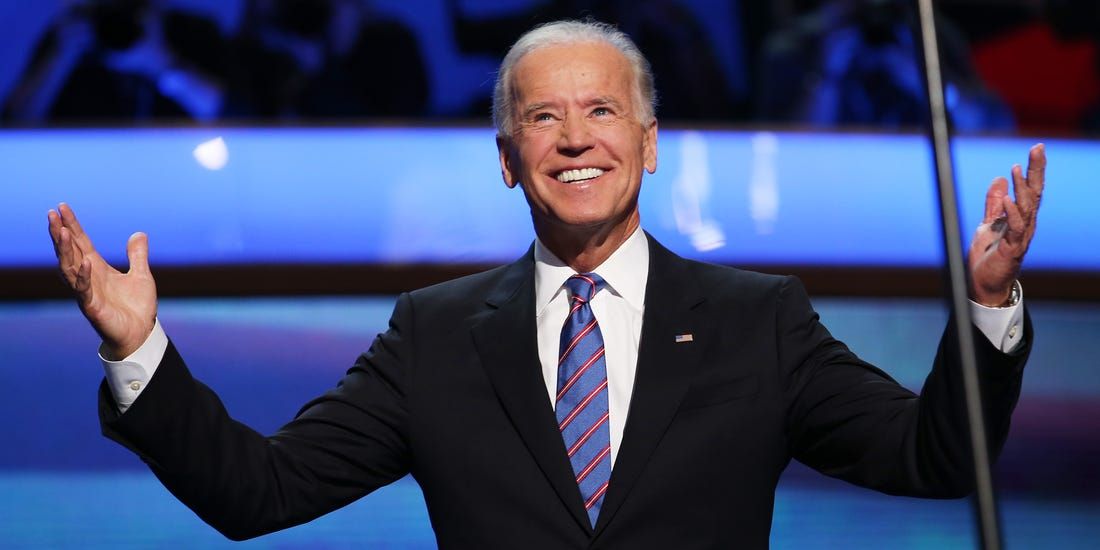Joe Biden’s campaign is holding huge fundraisers as it looks to challenge President Trump

A few minutes every morning is all you need.
Stay up to date on the world's Headlines and Human Stories. It's fun, it's factual, it's fluff-free.
With former Vice President Joe Biden securing enough delegates to lock up the Democratic nomination for president in early June, attention has turned to the November election.
Biden has been using a series of virtual events with some high-profile political allies to raise large sums of money, even as he’s mostly avoided public events.
The Biden campaign is going to need to grow their war chest substantially if they hope to compete with President Trump’s powerful fundraising apparatus. Trump essentially never stopped campaigning after 2016, maintaining a small campaign staff and officially announcing his bid for re-election in June 2019.
Joe Biden’s fundraising events
With much of the country in lockdown due to the COVID-19 pandemic and public events being discouraged, the Biden campaign has adapted to the situation by holding virtual fundraisers.
On Tuesday, June 9, Biden co-hosted a fundraiser online with Senator Kamala Harris, one of a number of women being considered as a possible running mate for the former Vice President. Though the two had previously sparred over their record during the primary campaign, Harris endorsed Biden in March and appeared at live events with the former VP before the pandemic.
The virtual fundraiser with Harris brought in US$3.5 million from 1,400 donors, just days after another Biden virtual fundraiser netted US$4 million in donations. Those two events were briefly Biden’s largest fundraising events.
The fundraising haul from those events was blown away a week later when Biden held another virtual fundraiser, this time with Senator Elizabeth Warren. Like Harris, Warren is a former rival for the Democratic nomination who is also being considered by Biden as a possible running mate.
The Biden/Warren fundraiser pulled in US$6 million from 620 people. Warren’s appearance at the fundraiser was somewhat ironic, given that Warren has frequently railed against money in politics and has specifically criticized private fundraising events like the one she participated in with Biden.
Warren similarly reversed course on accepting super PAC money for her own campaign, though she was still forced to drop out after her poor showing in the primaries.
In both fundraisers, Harris and Warren emphasized Biden’s character and made the case that Biden would be better than Trump at dealing with the current social upheaval, including the ongoing Black Lives Matter protests.
Joe Biden turns to Barack Obama
Throughout the primary, former President Barack Obama, who Biden served with as Vice President, remained mostly out of the spotlight. He waited until Biden’s last remaining rival, Senator Bernie Sanders, dropped out of the race before officially endorsing his former running mate.
On Tuesday, June 23, Obama followed up his endorsement by appearing with Biden for a virtual fundraiser that brought in a total of US$11 million for Biden’s campaign. US$7.6 million of that came from 175,000 donors who watched an open event, while the remaining US$3.4 million was raised from “high-dollar donors” in a private event.
During the fundraiser, Obama echoed sentiments shared by Harris and Warren, saying, “There’s nobody that I trust more to be able to heal this country and get it back on track than my dear friend Joe Biden.”
He also criticized the Trump administration, saying for them, “facts don’t matter, science doesn’t matter.” Obama also claimed that the current administration “actively promotes division.”
High-dollar campaigning
As Politico reported, those impressive numbers follow a May fundraising haul that gathered US$80.8 million and, more importantly, outpaced the Trump campaign’s monthly fundraising for the first time. Trump and the Republican National Committee (RNC) together raised US$74 million in May. Nevertheless, the Trump campaign still holds a substantial financial lead.
In April, The New York Times reported that Trump’s re-election campaign had raised US$212 million over the first quarter of 2020. That included a more modest March total of US$63 million, when the economy was experiencing the first effects of the coronavirus crisis.
In April, the Trump campaign, along with the RNC, told the Times that it had raised US$677 million in the first quarter of 2020 for Trump’s re-election, “$270 million more than President Barack Obama’s re-election campaign had raised at the same point in the 2012 campaign cycle.”
The price tag to be president
Presidential elections have gotten increasingly more expensive over the last four decades.
In 1980, Ronald Reagan spent US$185 million in his victory against incumbent President Jimmy Carter, who spent US$112 million. In 2000, George W. Bush won his election against Vice President Al Gore with a total of US$275 million (versus US$178 million).
Obama’s first campaign in 2008 holds the record for the largest amount of money spent in a presidential election by a single candidate. He spent US$898 million, more than doubling the US$443 million spent by his opponent, former Senator John McCain.
Outspending the other campaign didn’t work in 2016 for former Secretary of State Hillary Clinton, though. Her campaign spent US$621 million to Trump’s US$364 million, but still lost. Notably though, Trump was said to have received US$5 billion in free campaign airtime from media outlets hungry to cover his campaign.
Even with political donations dropping off due to the COVID-19 pandemic, the 2020 election is still expected to be the most expensive in history. Including money raised during the primary and by third party candidates like Libertarian Jo Jorgensen, more than US$2.6 billion has been raised by candidates so far this election season.
Have a tip or story? Get in touch with our reporters at tips@themilsource.com




Comments ()